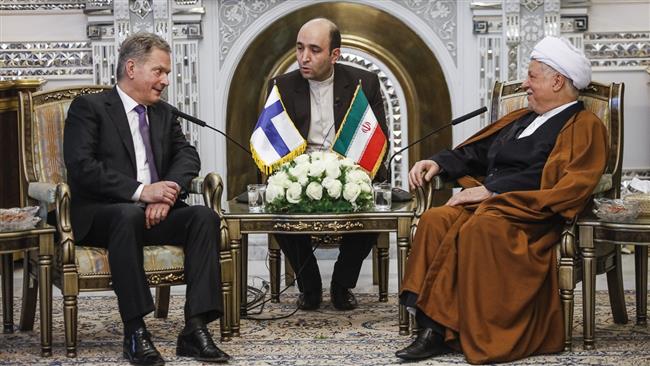Glad he’s dead, but there are many more to be put in their places….
The maroon Finnish president, Sauli Niinistö (and his hijab sporting wife) met with the terrorist mullah last October in Tehran, to my disgust I might add.
Iran’s Rafsanjani: A legacy of terrorism and repression behind a facade of moderation

Ray Takeyh is a senior fellow at the Council on Foreign Relations. Reuel Gerecht is a senior fellow at the Foundation for the Defense of Democracies.
Shortly before his death, Ali Akbar Hashemi Rafsanjani, Iran’s former president and clerical major domo, mused on the Holocaust. “For instance, it is said that six million Jews died. Later accounts reveal that although people died, many Jews were in hiding during those days; ‘the dead’ are actually still living.” The larger point of the interview was to remind Iranian officials not to quibble publicly with the fraudulent Western narrative of the Holocaust, for it only empowers Israel. Such was Rafsanjani’s method and guile: He frequently brandished a moderate image that concealed the reality of his militancy.
Most of the cleric’s obituaries in the Western press lament the death of a “pragmatist” who in reality was the most consequential architect of the theocracy’s machinery of repression and regional ambitions. Rafsanjani, not his acolyte-turned-tormentor Ali Khamenei, enshrined terrorism as an instrument of Iranian statecraft. It was Rafsanjani who was the driving force behind the development of the Islamic republic’s nuclear program.
The tragedy of Rafsanjani was that as he aged he seemed to appreciate the impossibility of the Islamic revolution. The limitations of this politically savvy cleric were most evident during his presidency. Assuming power after a devastating eight-year war with Iraq, Rafsanjani insisted that the imperatives of reconstruction and reform would guide him. His authoritarian tendencies, however, precluded empowering the private sector as he insisted on a strong state dictating the creation of a modern industrial economy. His crony-rich etatism led to a bloated bureaucracy, too much foreign borrowing, and a debt crisis. During Rafsanjani’s tenure, corruption became endemic. It was Rafsanjani who attempted to co-opt the Revolutionary Guards by giving them commanding positions in key sectors of the economy. The Islamic republic’s new class of wealthy revolutionaries, who all amassed fortunes through their connections to the regime and who make Chinese entrepreneurs look honest and transparent, are the real children of Rafsanjani.

